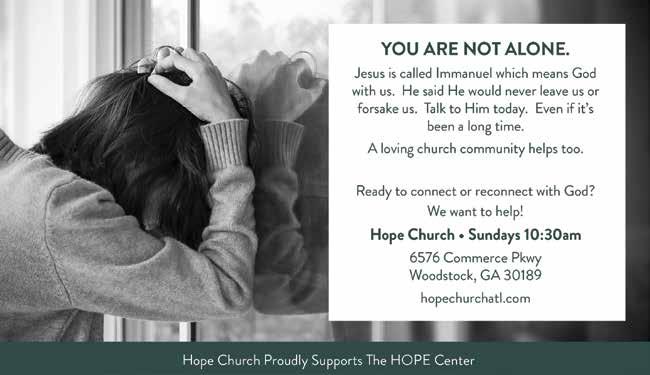
5 minute read
The Love Chromosome
LoveChromosome The
Are Babies With Down Syndrome Really a Blessing? Ask Derrick Tennant
When expectant parents are informed that their unborn baby has Down Syndrome, many wonder whether they should continue the pregnancy. They often fear the future, and what kind of life they and their child may experience. Abortion is often recommended to families grappling with such fears. But Derrick and Julie Tennant know better. Julie was born with Down syndrome. And her brother Derrick, who has his own disability, has a unique way of fighting for the lives of these precious people.
Derrick simply asks the question: “Do you want your kids to be happy?” Most parents — even those who initially name success, fortune, or good health as their dreams for their children — would concede that at the end of the day, they most want their kids to be happy. That can be a challenge. In fact, a survey from The Harris Poll found only 31% of American adults report being happy. But what if there was a way to practically guarantee happiness — for your kids and for yourself?
Derrick believes there are three ways to almost guarantee happiness. The first, he admits, is difficult. It’s to be a dog. Dogs are always happy. But that’s probably not in the cards for any of us. The second, Derrick says, is to be born with Down Syndrome. When parents ask: “What kind of life will they be condemning their child to?” Derrick’s response is surprising.
It will most likely be the life parents desire for their children: a deeply happy and joyful one!
And research backs him up. In fact, Derrick frequently cites a study similar to The Harris Poll’s with a startingly different result. In this second survey, a whopping 99% of participants reported that they were happy. What was the difference between the two groups? You guessed it: The members of the second

group all had Down Syndrome. And Derrick doesn’t just base his assertion that having Down syndrome is a great way to be happy on statistics. He’s seen joy personified in the form of his sister, Julie.
Doctors say that Julie was born with an extra chromosome. But Julie’s grandfather disagreed. He thought Julie had the perfect number of chromosomes. The rest of us are short one. Derrick likes to refer to Julie’s extra genetic material as the “Love Chromosome.” Julie herself wishes everyone could have one. Her extra chromosome has filled her life with hope, joy, and love that spill over to everyone she meets. That includes Derrick. And he’s not alone.
That same study of people with Down syndrome also interviewed their siblings who were age 12 or older. The researchers found that 88% believed they were better people because of their sibling with Down syndrome. Derrick certainly considers himself part of that group! Of course, not everyone will be blessed with a child or a sibling with Down syndrome — or win the chromosome happiness lottery themselves. Luckily, Derrick believes there’s a third way to ensure a happy life.
That third way is to choose generosity. Derrick believes that by sharing what you have, you receive many benefits in return. He likens being generous to having a magical bank account. Suppose, he says, every time you spend $100 to bless someone else, $400 is deposited into your account. You wouldn’t be able to give money away fast enough! That bank account might not exist, but Derrick believes love works the same way.
Derrick has learned this principle from watching Julie, who, he says, “loves organically.” Julie has been doing this ever since she was very young. At just five years old, Julie wandered away from her mother in the grocery store. This was terrifying enough. Then imagine her mother’s horror when she saw Julie throw herself into the arms of a strange man. And not just any strange man. A greasy, dirty, unwashed man who
smelled even worse than he looked. Julie’s mother rushed up to retrieve her child. But to her shock, she saw that the man was crying. “Lady,” he told her as he hugged Julie, “I can’t tell you the last time somebody wanted to hold me.” Julie had simply sensed his need for love and hurried to meet it.
Derrick says that the generous love of God, his family and his friends gave him the hope he needed to keep going after a random brain bleed left him with left-sided paralysis. With their support, he was able to believe that his life was still valuable. He saw the incredible value in Julie’s life. And he knew his could be similar—if he chose to live with love and generosity. Now, Derrick shares his message of selfish generosity around the world. He’s inspired thousands of people to make themselves happier by making others happy. And when you give generously to people in need, you can give them the hope they need to keep going, too. Many parents choose to end pregnancies because they’re worried that disabilities will keep their children from having happy lives. Derrick and Julie are both living proof that that simply isn’t true. But there have been times that they’ve both needed hope to keep going. They’re extremely grateful for the people who have supported them along the way so they can spread happiness to others.
If you’re reading this, you probably aren’t a dog. You may not have Down Syndrome. But you may be a parent yourself, or care deeply about the experiences of other parents. And the best way to help the kids in your life be happy is to be happy yourself. When you model generosity to your kids and the kids around you, you set an example that can set them up for lifetimes of happiness. And what parent doesn’t want that?








